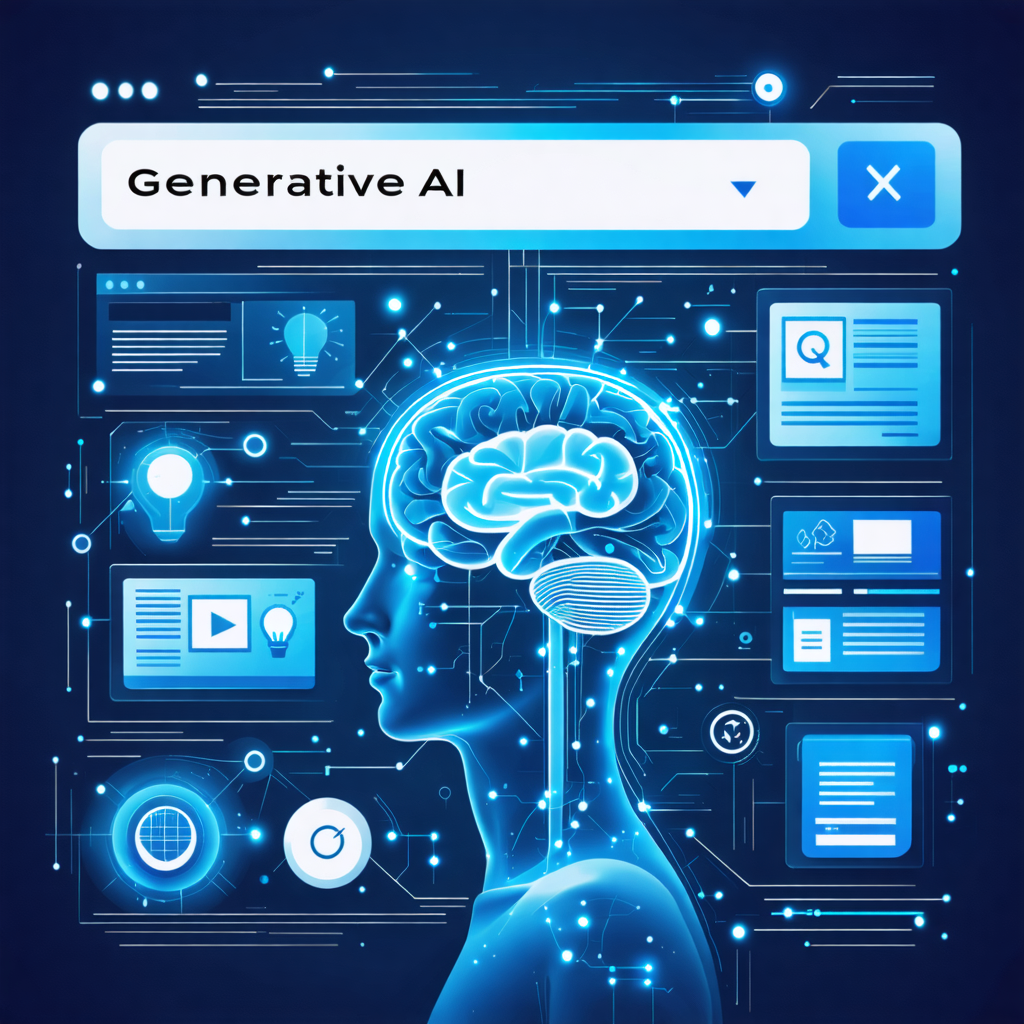The Role of Generative AI in Search: Opportunities and Challenges for SEO
%20(1).png)
Generative AI, like ChatGPT and Bard, has deeply changed our understanding of search. It has reshaped how results are presented and how users interact with the information they find. For SEO experts, the growing popularity of generative engines and their impact on search results and how people interact with them offers both opportunities and challenges.
How can you optimize content for an algorithm that interprets user intent with human-like precision, or for search results so dynamic that traditional ranking models seem outdated? Let's take a look at the evolving role of generative AI in search, uncover the opportunities for forward-thinking SEO specialists and examine the challenges that come with this transformation.
Spoiler alert—success in this new paradigm may hinge on an emerging concept called Generative Engine Optimization (GEO).

Key Takeaways
- Generative AI is changing search by providing direct, conversational answers, reducing reliance on external websites and turning traditional "query-result" models into interactive experiences.
- By using AI insights, optimizing for user intent, and leveraging generative engine optimization (GEO), businesses can create content that aligns with AI responses while driving engagement and conversions.
- Challenges demand innovation. Clickless search, algorithm changes, and new success metrics push SEO experts to stay agile, prioritize quality, and structure content for both AI and humans.
How Generative AI is Changing Search Results
Featured Snippets
We’ve all encountered featured snippets at the top of Google’s search results. Think of generative AI as a supercharged version of this functionality.
AI-powered models are now crafting comprehensive answers that often eliminate the need for users to visit individual web pages. Instead of directing users to a site, search engines increasingly use generative tools to provide direct, conversational answers within the search interface itself.
For example, “How to bake sourdough bread” might not just lead to a list of links. Instead, an AI system could synthesize the perfect recipe for sourdough, complete with tips, substitutions, and step-by-step guidance—without users clicking through a single link. This has a very important impact on traditional SEO.
Dynamic Search Behavior
Generative AI is moving away from the traditional “query-result” search model. Searches are becoming dynamic conversations, where engines respond iteratively to user follow-ups.
A user might ask, “What's a good laptop for video editing?” and then follow up with “What’s the best one under $1,000?” This means that SEO success hinges on optimization strategies that support conversational AI responses while still pulling clicks to websites.
Opportunities for SEO Experts
Generative AI doesn’t just disrupt, but also presents opportunities for those willing to adapt. Here are some key advantages it provides for SEO professionals.
1. AI Content Optimization
Generative AI tools can help you create better-performing content. Platforms like Creaitor and Jasper draw from massive datasets to craft headlines, meta descriptions, and entire blog posts optimized for engagement. With the right AI-driven insights, you can refine every detail to align with search engine preferences and user intent.
2. Keyword Clustering and Suggestions
Forget endless keyword brainstorming. Generative models can reveal new connections between terms. This empowers SEO teams to group and target keyword clusters effectively. Want to rank for “generative AI SEO”? Creaitors generative keyword research tool might suggest related terms or queries like “AI SEO best practices” and “chatbot-aligned content.”
3. Personalized User Experiences
Since generative technologies process large datasets at breakneck speed, they’re ideal for hyper-personalization. Imagine creating landing pages tailored exactly to the interests and preferences of your target audience. The result? Higher engagement and conversions.
4. A Boost in GEO – Generative Engine Optimization
Coined for the purpose of navigating generative AI's impact on search, Generative Engine Optimization (GEO) is the next phase of SEO strategy. GEO focuses on creating content crafted specifically to fuel generative answers while funneling users back to authoritative, click-worthy sources (your content!).
Challenges for SEO Professionals
Despite these immense opportunities, generative AI doesn’t come without obstacles. Adapting will mean facing—and overcoming—a few key hurdles.
The Clickless Search Dilemma
Clickless search, where answers are delivered directly on a search results page, is one of the biggest challenges. You could rank incredibly well for a query only to see minimal traffic if users get the answers without leaving a search engine's interface.
Keeping Up with Constant Algorithm Changes
Generative AI technology evolves rapidly, and search engines continuously tweak their algorithms to integrate these advances. SEO professionals must remain agile, testing and refining strategies more frequently than ever.
The Quality Conundrum
AI-produced content comes with its risks, including incorrect information or overly generic responses. Maintaining originality and a voice tailored to brand ethos remains crucial in an ecosystem where AI-generated content becomes mainstream.
Measuring Success in a Generative World
Virtually every SEO and GEO effort is measured by key metrics—rankings, CTRs, and engagement. But generative AI introduces completely new mechanics to search, often requiring new methods for tracking success like attribution models or conversational engagement metrics.
5 Strategies for Adapting to Generative AI
Innovation is vital as traditional SEO practices change. Here are the main areas where your team can focus to stay ahead:
- Prioritize E-E-A-T: Google prioritizes “Experience, Expertise, Authoritativeness, and Trustworthiness” (E-E-A-T)—and that hasn’t changed. Generative AI needs sources to pull credible information from, and building your site’s authority remains essential for visibility. High-quality backlinks, content depth, and a strong reputation in your niche should stay at the forefront of your SEO and GEO strategy.
- Optimize for User Intent: With generative AI aiming to match nuanced user queries, optimizing for micro user intents becomes non-negotiable. Instead of targeting generic terms (e.g., "best hiking boots"), aim for niche intent like, “best waterproof hiking boots for rainy climates.”
- Develop Content for AI Consumption: AI learns from your data. Optimize your content so it’s "easy to read" for AI tools as well as human users. Break down text into clear, structured headings and utilize schema markup for extra clarity.
- Be Persistent with Ownership of the Conversation: Even if generative AI provides conversational answers upfront, focus on positioning your content as an extension of that conversation. Use calls-to-action and value-rich content to entice users to finish their search experience on your website.
- Use Generative Tools Responsibly: Utilize AI tools to augment (not replace) your content creation process. Use platforms like Creaitor for idea generation, editing, and readability improvements, but always inject unique insights that only your team can provide.
Frequently Asked Questions
How do generative AI tools affect SEO strategies?
Generative AI requires SEO strategies to evolve. Traditional ranking factors remain important, but success now depends on creating content optimized for conversational AI. That means focusing on user intent, E-E-A-T (Experience, Expertise, Authoritativeness, Trustworthiness), and structuring content for AI readability while still driving clicks to your website.
What is Generative Engine Optimization (GEO)?
GEO is an emerging facet of SEO that focuses on optimizing content specifically for generative AI engines. The goal is to ensure AI platforms can easily use your content in their generative processes, while still encouraging users to visit your website for more value or detail.
What is 'clickless search,' and how does it impact my website traffic?
Clickless search happens when search engines provide complete answers within their results pages, so users don't need to visit external sites. While helpful for users, this can reduce website traffic, making it vital to optimize your content for visibility and engagement while enticing users to explore further on your site.
Bottom Line
Search engines powered by generative AI aren’t the doom of SEO; they’re an invitation to evolve and adopt generative engine optimization. With tools becoming smarter, decisions being tailored, and competition heating up, forward-thinking professionals have the chance to define best practices for the next era of search.
By understanding and addressing this technology early, your team can secure higher rankings, drive meaningful engagement, and uncover solutions competitors haven’t yet considered. If you’re ready to take your SEO and GEO game to the next level, start exploring the power of generative engine optimization with Creaitor today!
Blogs that you may also like

How to Create Perfect Conclusion Paragraphs with AI (Step-by-Step)

Email Response Generator: Write Perfect Emails in Half the Time

